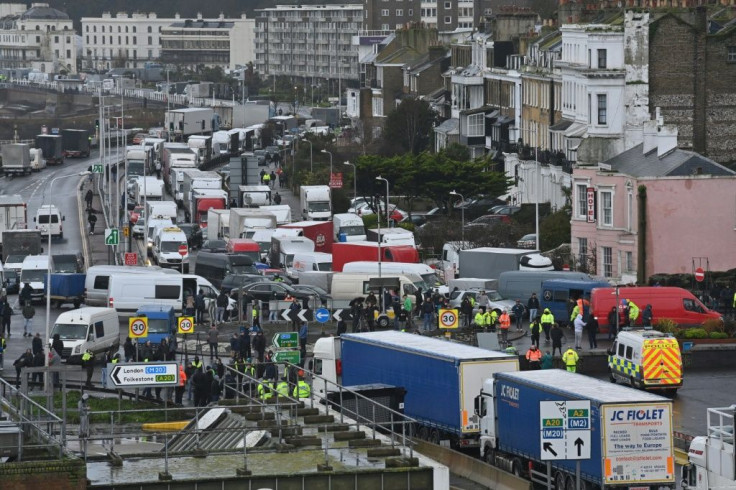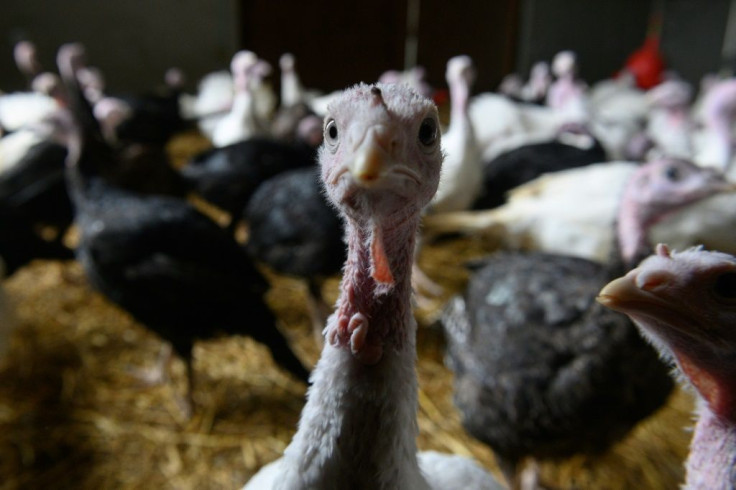Historic English Port Weathers Supply Storm
From backlogs in shipments to shortages of lorry drivers, Britain has been facing a worsening supply chain crisis sparked by Brexit and Covid.
Resurgent demand from reopening global economies has created supply bottlenecks, while tougher immigration rules and bureaucracy for foreign workers have led to crippling staffing issues.
But the management at Portsmouth International Port say they are weathering the storm, stepping in to help ease congestion at bigger, snarled up deep-sea ports.
For the director of the port on England's south coast, Mike Sellers, the situation is unprecedented in his decades-long career in the sector.
"I've been in the port industry for 30 years and I have never experienced such a perfect storm," he told AFP against a mountainous backdrop of neatly stacked containers.

"It's a combination of rare factors," said Sellers, as vast cranes silently shifted containers between lorries and ships.
Portsmouth is weathering the crisis because operators are seeking to save time after unloading cargo at nearby Southampton or further east at Felixstowe and not taking on empty containers for the return voyage.
"Portsmouth has benefited from the logjam... by repatriating empty containers," said Sellers, estimating that some 10,000 have been sent back to Asia via Europe.
"These would usually be loaded back onto the deep sea container ships. But due to vessels waiting to berth at the deep sea ports they are not filling them back up with empty containers to save time."

Portsmouth offers a "relief valve for supply chain issues in the short term" by helping cut waiting times at bigger ports, Sellers noted.
As a result, Portsmouth's total freight is currently down by just 10 percent, compared with its pre-pandemic 2019 level.
Portsmouth processes smaller volumes of containers that have been transported over short distances.
The global supply crunch and lorry driver shortage has been exacerbated by labour shortages in Britain, due to tighter entry requirements after its European Union departure.
Brexit, which took full effect on January 1 when Britain left the European customs union and single market, has also severely disrupted export and import activities to the bloc.

Consequently, there have been widespread shortfalls of everyday grocery items like bottled water, some meat products and fresh fruit and vegetables.
Fears about a shortage of lorry drivers to deliver motor fuel recently led to a run on the pumps, causing several weeks of empty filling stations -- and irate motorists.
According to Mark Simmonds, policy manager at the British Ports Association, the supply chain crisis has worsened since the start of the pandemic last year.
Sellers said there had been a slump in imports and exports from pre-Brexit levels, but he insisted "the logistics chain will sort itself out.
"It will take time, but it will balance out. But I think we've got at least another 12 months of issues around supply chains."
There has been much speculation in British media about the short-term impact of problems in the supply chain and labour market, particularly as Christmas approaches.
Festive fare such as turkeys and "pigs in blankets" (sausages wrapped in bacon) could be hit by a lack of butchers and abattoir workers.
Many of the seasonal workers used to come from the EU but have not returned after the pandemic.
The cost of Christmas trees could soar, due to import barriers and the rising cost of raw materials, while some toys could be absent from shelves.
After Covid restrictions hit last Christmas, limiting and even banning gatherings of family and friends, the government is keen not to be seen as Scrooge this year.
"We will celebrate Christmas (and) there will be food and toys," said Simmonds.
Back in Felixstowe, some container ships are still forced to drop anchor and wait days before they can dock and unload their cargo.
Danish shipping giant AP Moller-Maersk began in October to divert Felixstowe traffic to continental ports like Rotterdam and Antwerp, before switching to smaller vessels for UK deliveries.
The key September-October period is critical time for retailers to fill their warehouses in preparation for Christmas.
© Copyright AFP 2024. All rights reserved.











